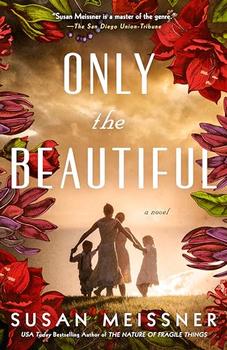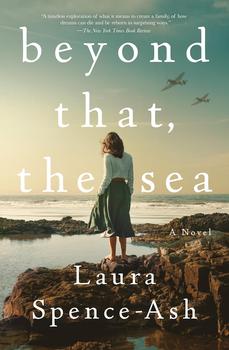Summary | Excerpt | Reading Guide | Discuss | Reviews | Beyond the book | Read-Alikes | Genres & Themes | Author Bio

Roseanne "Rosie" Maras' life has imploded. Her family is dead, her new guardians, the Calverts, treat her like a maid, and she's just discovered she's pregnant. Even worse, her darkest secret—she sees colors when she hears sounds—has been revealed, making her circumstances even more dire. Robbed of her freedom, Rosie finds herself fighting for her future and the future of her unborn child. Years later, her old friend Helen Calvert returns home to America after spending World War II in Europe. Expecting to find Rosie still living with her brother and sister-in-law, Helen is shocked to hear what became of her. Determined to find Rosie, Helen finds herself encountering the same discrimination against differently abled individuals as she did living under the Nazi regime. Spanning from the 1930s to the 1950s, Susan Meissner's Only the Beautiful explores the eugenics movement in America and Nazi Germany through the eyes of two women determined to reunite a young girl with her family.
Only the Beautiful is told from the points of view of both Rosie and Helen, with each woman's story encompassing two timelines. In each section, the two timelines serve as a before-and-after, with chapters alternating between years until the timelines eventually catch up to one another. Rosie's section begins with her being taken away in disgrace, her pregnancy and her secret—a condition known as synesthesia (see Beyond the Book)—both revealed; the next chapter returns to the year before, shortly after the deaths of Rosie's parents and younger brother. This back-and-forth chapter set up allows readers to slowly understand the events that have led to Rosie's current circumstances while also keeping them glued to the page. While the "past" chapters are slower-paced and informational, the "present day" chapters are nerve-wracking and eye-opening. Readers will continue not only to get the answers to the two biggest questions of Rosie's story—who is the father of her child and does Rosie’s synesthesia make her unfit to be a mother? —but also to satisfy their morbid curiosity of what terrible thing will happen next for Rosie.
Helen's story is likewise shocking. Having served as a nanny in Europe for decades, Helen eventually goes to work for an Austrian family whose youngest child has both physical and developmental disabilities. After the occupation of the country by the Nazis, Helen discovers the true horrors of Hitler's regime and is faced with a heartbreaking decision. Although readers will be familiar with the Holocaust, fewer are likely aware of the true extent of the Nazi belief in "racial hygiene" and the T4 Euthanasia Program. Under this program, any individual who the Nazi regime deemed a burden to society or with a life "not worth living" was killed. This list of people included not only those with fatal diseases but also the elderly and people with physical or mental disabilities.
Even less commonly discussed is America's eugenics movement, which began in the early 1900s and continued in some places up through the 1960s. This movement led to the lawful sterilization of tens of thousands of individuals without their consent in order to prevent them from passing on their "feeblemindedness". When Helen returns home to America, she finds that these opinions and procedures closely align with Hitler's vision for hereditary purity, and she begins to speak out against such atrocities. Meissner's extensive research into this time period and movement is clear in her detailed descriptions of mental institutions and the resistance Helen meets as she advocates for the differently abled; although the accuracy of her writing is often gut-wrenching, the stories of these men and women and the terrible treatments they were forced to endure deserve to be shared, and Meissner has found a way to, like Helen, serve as a voice for these individuals to a new generation of readers.
Brutal and heartbreaking, yet ultimately joyful, Susan Meissner's book not only shines a light on a dark period in American history but shows the importance of speaking out for what's right. Only the Beautiful is a story of determination, family, and hope that will appeal to readers of historical fiction with strong female leads or anyone looking for a World War II story that's rarely been told.
![]() This review was originally published in The BookBrowse Review in May 2023, and has been updated for the
March 2024 edition.
Click here to go to this issue.
This review was originally published in The BookBrowse Review in May 2023, and has been updated for the
March 2024 edition.
Click here to go to this issue.

If you liked Only the Beautiful, try these:

by Elana K. Arnold
Published 2024
From Michael L. Printz honoree & National Book Award finalist Elana K. Arnold comes the harrowing story of a young girl's struggle to survive the Holocaust in Romania.

by Laura Spence-Ash
Published 2024
A sweeping, tenderhearted love story, Beyond That, the Sea by Laura Spence-Ash tells the story of two families living through World War II on opposite sides of the Atlantic Ocean, and the shy, irresistible young woman who will call them both her own.
I like a thin book because it will steady a table...
Click Here to find out who said this, as well as discovering other famous literary quotes!
Your guide toexceptional books
BookBrowse seeks out and recommends the best in contemporary fiction and nonfiction—books that not only engage and entertain but also deepen our understanding of ourselves and the world around us.